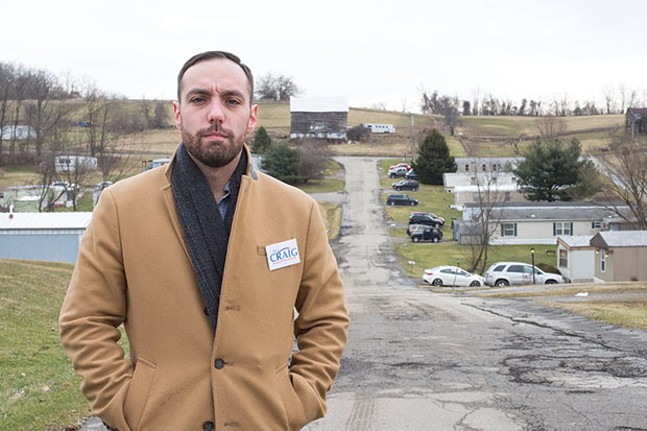
James Craig loves grabbing a hot dog at Shorty’s Lunch in downtown Washington, Pa. If this rural county has a melting pot, it’s this small, crowded diner where the secret to the food is the flattop grill that’s only been replaced once since the joint opened in 1932.
“I love coming here because there’s this amazing mix of people in here having lunch,” says Craig, a recently announced Democratic candidate for the Pennsylvania Senate. “You’ve got folks in here who’ve been out working the line, eating next to lawyers who work down the street at the courthouse.”
Craig isn’t the only guy who loves Shorty’s. In 2003, when developers tried to take the property — along with several others — by eminent domain for a mixed-use development, more than 23,000 people signed a petition opposing the move. A pretty good number for a city with a population just above 13,500.
The busy eatery is the perfect place for Craig to talk about his campaign to oust incumbent state Sen. Camera Bartolotta (R-Monoghela) in the 46th District, the California native who ousted incumbent Tim Solobay in 2014. Bartolotta rode a GOP wave into office and was the first Republican to hold the seat in nearly 40 years. But Craig contends getting elected in this rural district — that stretches from south Beaver County, though Washington County and down into Greene County — has little to do with whether you have an “R” or a “D” after your name.
“I’m running because I think I can do the job, and because the current state senator is out of touch with what this district needs,” Craig says. “Not many people have had the arc that I’ve had in my life. I can see the whole picture, and the vast majority of folks can only see part. People born into wealth and privilege don’t know what it’s like to live in abject poverty. They may feel empathy for you, but they don’t know what it’s like to have your heat turned off in the middle of winter, but those are the hardships that many of us have faced.”
For Craig, getting elected has more to do with knowing what residents in this area are going through and what assistance they need to get through it. The district, he says, needs someone who knows how to help because they’ve lived the same lives and suffered through the same hardships.
If that’s the case, then James “Jimmy” Craig could have a real shot of winning this race in November, because he’s got a hell of a story to tell.
The Story
Today, Craig, 29, is a married attorney living in North Strabane Township, a bit northeast of Washington. He owns his own mortgage-closing company that specializes in offering free services to help veterans, police officers, firefighters and first responders purchase homes.
But he grew up in the Brookhaven Trailer Park, in South Franklin Township, until age 6. Then his family moved to extremely rural West Finley Township, near Greene County on the West Virginia border. The first few years of his life were pretty normal until his father, an ironworker, had his leg crushed by a steel beam.
“I really remember that day vividly. We were in Walmart, and my mom was paged over the intercom. My grandmother had called to tell us that my dad had been in an accident,” Craig says. “My dad was the sole bread-winner for our family. For about two years, we didn’t have any income, except for a little bit of worker’s comp until he finally got social-security disability. But in that time, we had lost our home, and I was young and didn’t fully understand what was going on.”
His family would spend the next several years bouncing around. After a short stay at a Days Inn, the family moved in with his mother’s parents until “we outstayed our welcome.” His mom stayed with her parents, and Craig and his dad went to live with his dad’s parents. “Eventually we got a place in Buffalo Township, but we couldn’t keep up with the rent and were evicted,” Craig says.
During this time, Craig’s parents became severely addicted to opioids: His father had a prescription because of his accident, and his mother was given pills for fibromyalgia pain.
The family finally settled in a trailer on the back lot of a farm. But at age 15, he started living with a rotating group of friends — many of whose parents acted as surrogates for Craig — more than he was at home. He credits them for helping to keep him sane during the times of homelessness, parental drug addiction and neglect.
“I had several adopted mothers who would send me home with bags of food so that I could eat,” Craig says. “One time, I went on a Boy Scout trip, and the mother of one of my friends slipped me $100, so I could take part in the activities. I’ll never forget stuff like that.”
Craig began working as much as he could at a young age on weekends, evenings and throughout the summer. Despite that schedule, he still did well at school and spent a lot of his free time reading, mostly history books. These weren’t just idle pursuits. Craig’s home life was an unfixable disaster, and he made it his goal to get himself out through education. He was accepted at the University of Pittsburgh and, except for the summer after his freshman year, he wouldn’t return home again until he heard that his father had become ill.
In 2014, his father was diagnosed with terminal cancer and given a short time to live. He was given palliative care to treat his pain and suffering. Craig’s mother found it difficult to deal with her husband’s illness; she died of a drug overdose shortly after his diagnosis after she took some of her husband’s prescribed morphine. It wasn’t the last time addiction would hit Craig’s life. In 2016, his brother died from an overdose of fentanyl-laced heroin a few years later. Craig’s father is still living with cancer today, and the pair maintains a relationship.
But if he hadn’t been able to extricate himself from the situation, who knows how James Craig would have ended up? He’s wondered that himself, and it’s the main reason that he’s running for office.
“If you don’t do things exactly right and have luck fall your way every time you need it, you won’t get out,” Craig says. “So, that’s at the fundamental core of why I’m running for this office. The people of this district have been forgotten for a very long time. That’s why they came out to vote in droves in 2016. I’m entering this race with a chip on my shoulder. I’m fighting for the people who came from where I came from. I’m fighting for the kids who deserve their own shot at getting out.”
The District
Craig has labeled himself a “blue-dog Democrat,” a more centrist group that has seen its numbers in elected office dwindle as others in the party have moved (or at least pretended to move) to the left. He wears that title as a badge of honor, and says a lot of the district’s residents identify that way, too.
They care about people, he says. They work hard, keep their heads down and “don’t like people telling us what to think or feel.” So, when Hillary Clinton made her infamous “basket of deplorables” comment in 2016, Craig says a lot of residents in Washington and Greene counties took it personally.
“I can tell you that I took it personally,” Craig says. “Look, the people of Southwestern PA may have differing opinions on social issues, but they’re not racist, they’re not deplorable. We’ve been left out of the political discussion, and we’re tired of the way things are being run.”
That’s why Craig understands what his friends and neighbors found so appealing about Donald Trump. And that’s why he’s specifically reaching out to them in his campaign.
“People from where I come from found their voice finally in politics,” Craig says. “They had been so disenfranchised for so long, and someone finally spoke to the issues that were important to them. Now, there was a lot of other stuff mixed in there too, unfortunately, but he talked to people like they were human beings.
“Just talking to people can make a difference.”
In between bites of hot dogs with “everything” at Shorty’s, Craig stops to clarify an earlier point. “I am a millennial blue-dog Democrat and to me, that means I care about who you are as a person and not whether you have a ‘D’ or an ‘R’ after your name. I want to dispel the myth that being moderate and being progressive are the exact opposite of one another. There’s progressivism in issues that are largely thought of as conservative issues.
“I’m against wasteful government spending, but that doesn’t mean that I’m against social programs that help people, because I’m not and that’s progressiveness.”
In terms of wasteful government spending, Craig points to the spending budget for the state legislature which includes a lot of “frills and window-dressing” like per diems, reimbursements and sending out mailers that he says are nothing more than taxpayer-funded campaign materials. He also favors a reduction in the size of the state house.
On the other hand, Craig says he can’t imagine eliminating a program like CHIP which provides health care to children, or other social services that help the district’s most vulnerable citizens.
“I had scarlet fever when I was 9. Without CHIP, I probably wouldn’t have been taken to the hospital, and I probably would have died,” says Craig, who believes there are many social programs that seek to level the playing field for those less fortunate. “I believe in an ‘Ameritocracy.’ If you work hard and are determined, you should be able to achieve what you want to achieve. It shouldn’t depend on luck and who you know.”
Those sentiments are also what drive Craig’s plans for education. He says you shouldn’t get a lesser education just because your family can’t afford to live in a more affluent district. He says determining the health of schools based on that district’s property taxes is inherently unfair. A poor district means less property tax; less property tax means less spent on education. If the district performs poorly, then no one is going to move into the district, thus the cycle of poverty continues, he believes.
Craig says the formula of funding schools “based on imaginary lines has to be turned on its head.” He says the state’s school-funding system needs to be revised so districts are funded equally. “I know a lot of people in more affluent districts are going to be upset because they don’t think they should be paying for poorer districts,” Craig says. “But my answer to that is: If you have a good school, it will stay a good school. And if you have a school that’s struggling — guess what — a dollar spent there is going to have a much greater impact than a dollar spent in Fox Chapel.”
Another major issue facing Pennsylvania’s 46th District is the crush of opioid addiction — an issue Craig knows too well. When Craig’s mother suffered from it, it was something you hid and were ashamed of. But views on opioid addiction have changed more recently.
“I come from a place of empathy and hope for recovery, instead of a place of judgment based on moral grounds,” he says. “You have to know this disease to work on a cure, and I know what this disease can do. I think more people will listen to me because of my background, and I’m sad it has to be that way, but I’ll take it.
“If they listen because of who I am and what my family has gone through, then I’ll take it.”
The Bigger Picture

James Craig’s candidacy to help the people of the 46th District could have implications beyond the district’s borders. The first year of President Donald Trump’s term has a lot of Democrats looking to make a difference in the midterm elections, at both the federal and the state levels. Many are expecting a blue wave of candidates into office, much like the red wave of Republicans in 2010, 2012 and 2014.
In this year’s state senate races, there are seven seats up for grabs in districts that Hillary Clinton won in 2016. Turning all seven would mean a tie in the senate with the lieutenant governor casting the deciding vote.
If Craig can beat Bartolotta in his home district, that would give Democrats an edge. And if a Democrat has a shot to win an election in Trump country, pollster G. Terry Madonna, director of the Center for Politics and Public Affairs at Franklin & Marshall College, says a blue-dog Democrat probably has the best chance.
“We’re seeing Conor Lamb making a run at Tim Murphy’s old seat. That’s the real first test case we’re going to see,” Madonna says. “Republicans took seats in 2010 in rural districts, and they made big in-roads getting Republicans elected in places like Erie and Johnstown, something I never thought would have happened 10 years ago.
“But as a political-science historian, I get caught up on the issues; that’s not what average voters do. For them it’s ‘what have you done for me lately.’ So, we’re going to have a real test this year in places like Pennsylvania, Wisconsin, Ohio and Minnesota. Can moderate Democrats take back some of these seats?”
Madonna says Bartolotta seems “active and engaged” in her district and therefore Craig is going to have to bring something to the table — like his story and knowledge of the district — to show why he deserves the office more than her.
“Also, it will be important that he reaches those Democratic Trump voters who felt like the party abandoned them. He’s got a solid narrative, and that will be matched up against the groundwork she’s laid as an incumbent. At the very least, he’s going to make this race very interesting.”
One lesson of the 2016 presidential election is that it’s difficult to predict what might happen. That year, 60 percent of the 46th District voted for Trump compared to 36.5 percent for Clinton. But, as Craig explains, the residents of the district were looking for someone to listen to them — someone who cared about their issues and respected where they came from. You don’t have to make a long stretch to come to the conclusion that James Craig could be that person.



















